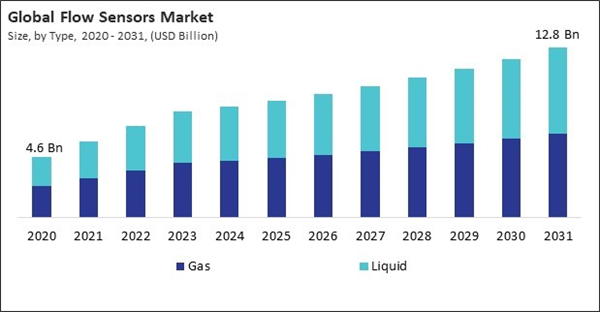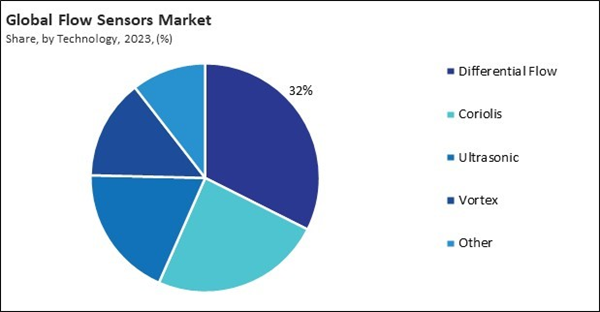Europe has strict environmental and safety regulations that require precise flow measurement for compliance. These sensors are essential for monitoring emissions, ensuring safety, and adhering to quality standards. Consequently, the European region would acquire nearly 31% of the total market share by 2031.
Industrial automation involves using advanced control systems, robotics, and software to perform tasks that were traditionally done by humans. In addition, automation is fundamentally about improving efficiency and productivity. Industries can streamline operations, reduce downtime, and minimize human error by integrating these sensors into automated systems. Thus, rising demand for industrial automation is driving the market’s growth.
Additionally, these sensors are vital for managing and optimizing the use of resources such as water, fuel, and energy. By providing accurate measurements of fluid and gas flows, these sensors help industries monitor consumption levels, identify inefficiencies, and make data-driven adjustments to minimize waste. Also, the shift towards renewable energy sources, such as solar, wind, and bioenergy, requires precise flow measurement to manage the flow of energy and resources in these systems. Hence, demand for energy efficiency and sustainability is driving the growth of the market.
However, these sensors, particularly those designed for high accuracy, extreme conditions, or specialized applications, can be costly. The integration of these sensors into existing systems and processes is frequently a complex process. This complexity arises from ensuring compatibility with existing equipment, software, and control systems. Custom integration may be required, leading to additional costs and technical challenges. Thus, high initial costs and installation complexity hinder the market’s growth.
Driving and Restraining Factors
Drivers- Rising demand for industrial automation
- Demand for energy efficiency and sustainability
- Expansion of the global oil and gas industry
- High initial costs and complexity of installation
- Lack of standardization across industries
- Growth in the microfluidics and lab-on-a-chip industry
- Opportunities in the renewable energy sector
- Accuracy and calibration challenges in harsh environments
- High customization requirements for diverse applications
Type Outlook
Based on type, the market is divided into gas and liquid. The liquid segment witnessed a 49% revenue share in the market in 2023. Many industrial processes involve the flow of liquids, including manufacturing, chemical processing, and water treatment.Technology Outlook
On the basis of technology, the market is segmented into differential flow, coriolis, ultrasonic, vortex, and other. In 2023, the coriolis segment attained 24% revenue share in the these sensors market. Coriolis meters measure mass flow directly and are less affected by temperature, pressure, or viscosity changes. This reduces the need for additional compensation and simplifies the measurement process.Application Outlook
By application, the market is divided into process industries, automotive, healthcare & medical, environmental, consumer electronics, and others. The automotive segment procured 22% revenue share in the market in 2023. These sensors are crucial for optimizing engine performance. They help monitor and control the flow of various fluids, such as fuel, air, and coolant, ensuring efficient combustion and engine operation.Regional Outlook
Region-wise, the market is analyzed across North America, Europe, Asia Pacific, and LAMEA. In 2023, the North America region witnessed 36% revenue share in the market. North America has a well-established and advanced industrial sector, including manufacturing, chemical processing, and oil and gas.List of Key Companies Profiled
- RECHNER Industrie-Elektronik GmbH
- Proxitron GmbH
- Siemens AG
- Sika AG
- TE Connectivity Ltd. (First Sensor AG)
- Emerson Electric Co.
- Sick AG
- Omega Engineering, Inc. (Arcline Investment Management)
- Christian Bürkert GmbH & Co. KG
- TSI Incorporated
Market Report Segmentation
By Type- Gas
- Liquid
- Differential Flow
- Coriolis
- Ultrasonic
- Vortex
- Other
- Process Industries
- Automotive
- Healthcare & Medical
- Environmental
- Consumer Electronics
- Others
- North America
- US
- Canada
- Mexico
- Rest of North America
- Europe
- Germany
- UK
- France
- Russia
- Spain
- Italy
- Rest of Europe
- Asia Pacific
- China
- Japan
- India
- South Korea
- Australia
- Malaysia
- Rest of Asia Pacific
- LAMEA
- Brazil
- Argentina
- UAE
- Saudi Arabia
- South Africa
- Nigeria
- Rest of LAMEA
Table of Contents
Companies Mentioned
- RECHNER Industrie-Elektronik GmbH
- Proxitron GmbH
- Siemens AG
- Sika AG
- TE Connectivity Ltd. (First Sensor AG)
- Emerson Electric Co.
- Sick AG
- Omega Engineering, Inc. (Arcline Investment Management)
- Christian Bürkert GmbH & Co. KG
- TSI Incorporated










